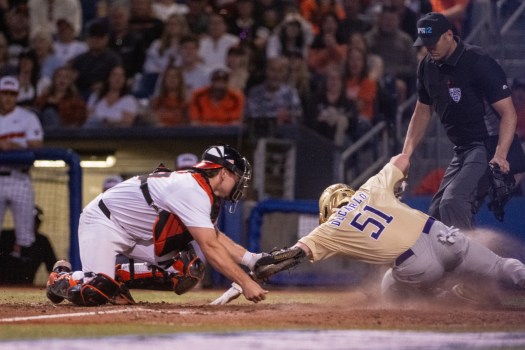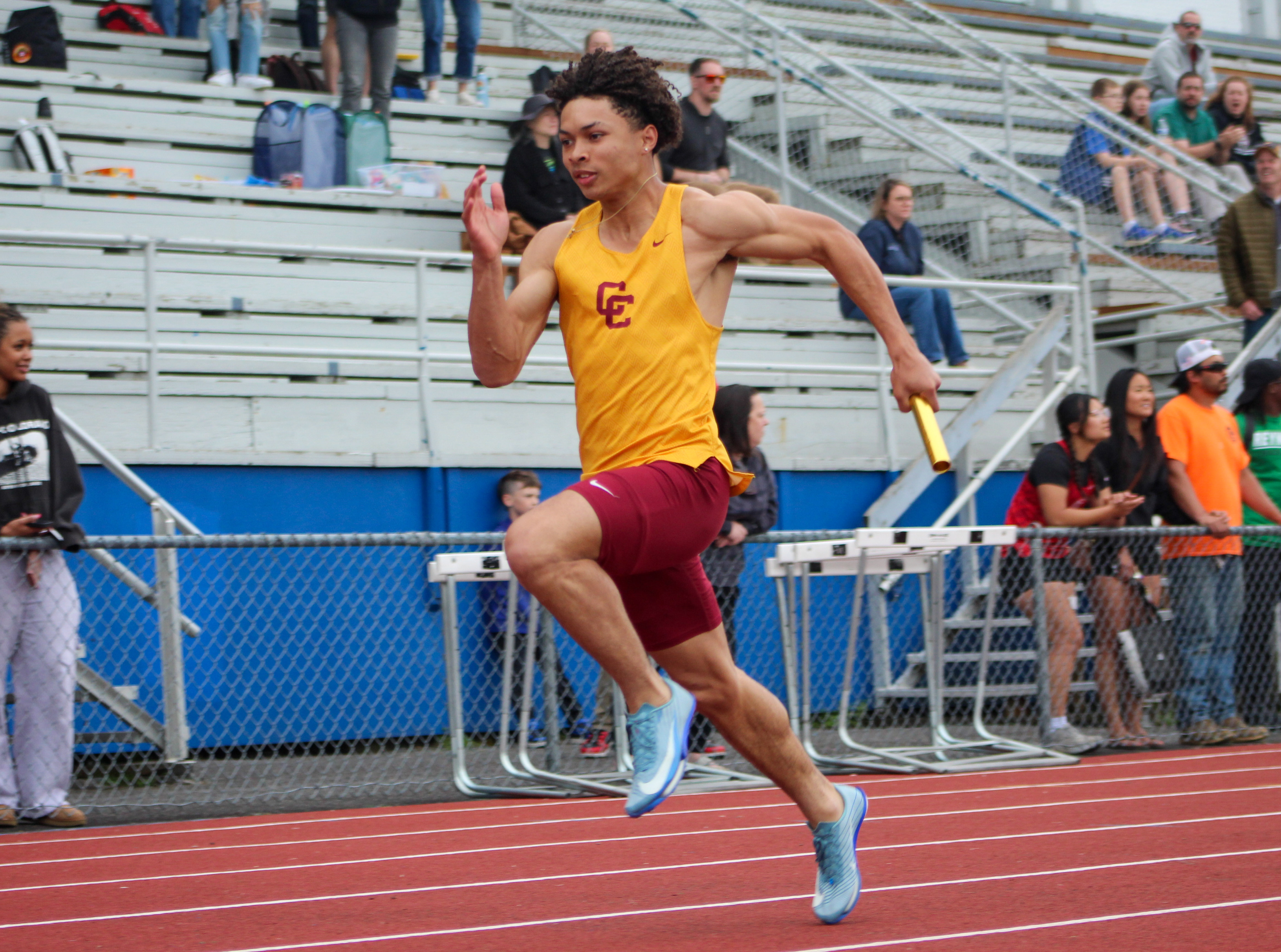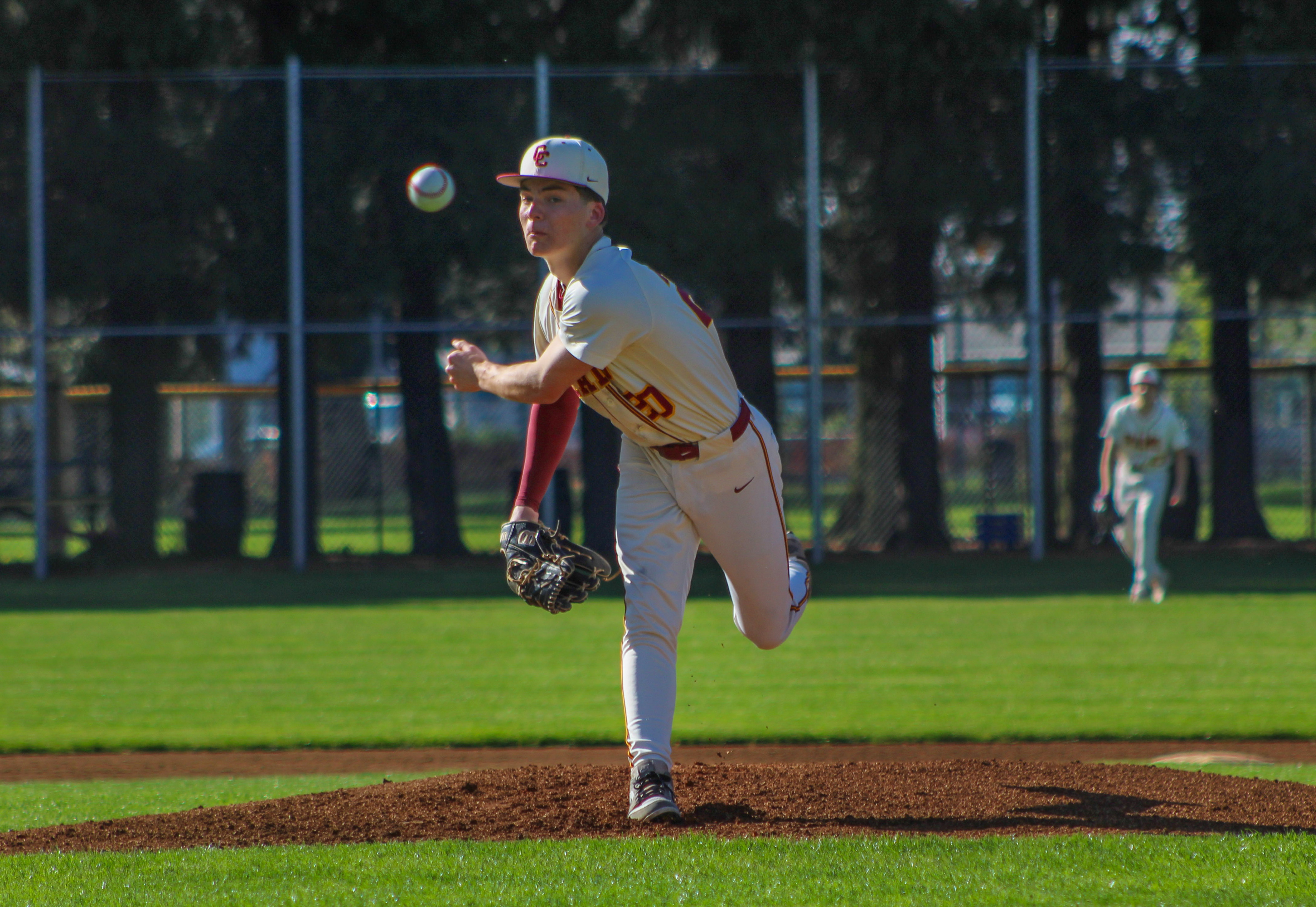Little Bitty Backstop: Oregon State baseball’s Wilson Weber leads charge to postseason
Published 8:57 pm Thursday, May 22, 2025
For all of baseball’s quirks and oddities, few things that the nearly 200-year old game has birthed may be as culturally synonymous with baseball as the walk-up song.
In the sport’s history, the 15-ish-second long snippet of a song played as a batter comes to the plate is a fairly new invention. Its roots date back to the 1970s on the southside of Chicago, when the White Sox hired a local organist to introduce players. The trend spread throughout the sport so much that now, from little leagues to the majors, every ballplayer has a walk-up song and every fan in the stands has thought about what their hypothetical anthem would be.
But few people have hit the nail on the head quite as well as Oregon State’s senior catcher, Wilson Weber.
After briefly trying out rapper Meek Mill’s 2016 song “Blue Notes” to announce his arrival and taking a more silly route with cuts from the “Madagascar” soundtrack during summer ball stints in the West Coast and Cape Cod Leagues, Weber settled on Alan Jackson’s 1996 song “Little Bitty” for his junior season with the Beavers. Weber’s choice of the following excerpt has been a mainstay on weekends in Corvallis ever since.
“Well, it’s alright to be little bitty
A little hometown or a big old city
Might as well share, might as well smile
Life goes on for a little bitty while”
“What would really fit me and Corvallis?” Weber said, explaining how he chose it. “I’ve always liked Alan Jackson. The song was catchy when I started walking up to it, so I’m going to rock with it.”
Jackson’s lyrics and Weber’s explanation of why he chose them aren’t exactly the deep end of the songwriting pool. Weber just happened to live in a small college town and liked the way it sounded.
But the more and more “Little Bitty” pumps out of public-address speakers and fills the air of Oregon State’s Goss Stadium, the more the lyrics — with themes that draw on being content and enjoying life as it is — paint an abstract picture of Weber’s final season as a Beaver.
“Well it’s alright to be (back as a senior)”
Weber’s final year as a Beaver almost never happened.
As a junior in 2024, Weber split time behind the dish with fellow class of 2021 recruit Tanner Smith.
The two saw a near-perfect divide, with Smith making 32 starts and Weber recording 29 for Oregon State on its second NCAA super regional run under head coach Mitch Canham. Smith was the better controller of the basepaths, throwing out 13 of the 24 steal-attempts on him, compared to Weber’s 3-for-26 mark. But Weber’s bat (.276/.380/.569) was more productive than Smith’s (.221/.359/.423), giving the Beavers a pick-your-poison platoon at the catcher position.
When the 2024 season came to an end, both catchers were draft eligible and would have plenty of prospective suitors in the transfer portal. Smith settled on the transfer option, finishing out his collegiate career in South Beach as a Miami Hurricane. Weber, however, was unsure about what to do.
“I was on the fence,” Weber said. “I didn’t play a ton last year, so I could maybe take last-five round money basically (and go pro). So do I take that and go play pro ball? Or do I want to come back and use my last year of eligibility? Its a risk. I might not have the opportunity after another year, you’re out of eligibility and leverage. So what’s best for me?”
The draft was an option, Weber said, but he wasn’t featured in Baseball America’s top-500 draft prospects list come the end of the 2024 season. While that hasn’t ever stopped professional clubs from drafting players whenever they feel, players selected outside the top-15 rounds (roughly equating to the top-500) aren’t making the life-changing money that Weber’s teammate, No. 1-overall selection Travis Bazzana, did when he signed an $8.9 million contract with the Cleveland Guardians.
The risk Weber brought up regarded contract values, which fall even more for seniors. While juniors like Bazanna are able to negotiate with the leverage of going back to school for a fourth year, seniors who have used their fourth-year are at the mercy of the club, often signing for pennies on the dollar.
But the same ifs, buts and worries go the other way, according to Canham.
“Those are some of the things we have to face,” Canham said. “What if you sign and miss out on a year of college? What if you end up getting hurt (in pro ball)? We know how much (Weber) loves this place and what he’s capable of doing.
“So, we said, ‘Dude, come in and run it. This place could be yours. If you do the job, I’d be silly to not play you every day.’”
“A little (college)town (and) a big (new job)”
Weber took Canham up on the offer, returning to Oregon State for his senior season.
Weber said it was still a hectic decision to make, saying he worried that he was passing on a once-in-a-lifetime opportunity. But as soon as Weber was back in Corvallis, he knew he was back where he was supposed to be and looked forward to expanding his role from one-half of a catcher platoon to the Beavers’ everyday backstop for the first time in his collegiate career.
Since he was in eighth grade, Weber has been a catcher.
As most standout athletes do, Weber came up in little league and travel ball systems as a middle infielder. From there he moved to third base before the eventual move to behind home plate, where he starred for Barlow High School in Gresham. Weber has never appeared in the field at any other position but catcher as a Beaver, the squat is home.
“I’ve always thought about that. What if I didn’t make that change?” Weber said. “Would it be as much fun? I don’t know. Infield is definitely more moving around, more action than the outfield. I’ve thought about that, too. I don’t know if I could play the outfield, it’s a lot of standing and waiting. So I’ve really enjoyed catching. You’re in every play, you’re controlling the whole game.”
When Weber says he’s in every play, he means it. And in more ways than one.
Canham held true to his promise, it’s been Weber’s show behind home plate this season. He has played in 53 of Oregon State’s 54-game regular-season schedule in his (still uncompleted) senior year, starting 49 of them. Weber’s lone day off, an 8-3 win over Gonzaga on April 22, saw junior Bryce Hubbard — one of four other catchers on the roster, but the only to appear in a game for Oregon State besides Weber — behind the dish. Canham raved about Weber’s off-field recovery efforts as well, citing that the senior takes full advantage of the program’s resources to keep himself ready.
“Whatever all the stuff is that they have now, Weber uses it,” Canham said, chuckling. “Which is great, we had, what? Ibuprofen? You-be-playing.”
The everyday role at the most-difficult defensive position is a point of pride for both Weber and Canham — a former catcher himself — who said he can “almost sleep better at night” knowing who he has running the show behind the dish. To compensate for the wear-and-tear of the position, Weber says he’s 15 pounds heavier than he was last season.
“It’s so much more than the actual physical aspect of catching (the baseball),” Weber said. “You’ve got to talk to the umpire, you’ve got (pitching coach Rich Dorman) in your year asking questions. You’ve got to look at the pitch call and then go talk to the pitcher without Dorman sometimes… It’s definitely a whole thing and it’s why it’s so hard.”
While Weber can speak at length of the defensive intricacies that come with playing catcher — and did so — hitting almost sounds like an afterthought when he talks about it. The simplicity off the tongue is more a reflection of his refinement at the dish, with a co-hitter of the week award from the National Collegiate Baseball Writers Association and a .332/.415/.576 slash-line to show for it.
“(Sit) middle-away, on-time for heater,” Weber said.
To the untrained eye, Weber has made balancing both jobs look easy. And even to the trained eye, he’s still making it look easy. Weber was announced as one of 13 semifinalists for the Buster Posey Award, the top honor for collegiate backstops.
Weber’s two errors and five passed balls puts him in the middle of the pack amongst the 13, while his OPS (.908) checks in as the fourth-highest. His greatest separator, however, comes from the simple number of innings Weber has caught for the Beavers, logging 537-total defensive chances. Only one of the dozen other candidates (Florida’s Luke Heyman) comes close to Weber’s workhorse season, logging 500, while the rest sit some 100-150 chances behind Oregon State’s go-to catcher.
But somehow, none of it — the stellar defense, the offensive prowess — are what has made the senior so important to the team.
“Might as well share, might as well smile”
Weber is the leader.
And his actions of leadership are what ties Jackson’s lyrics together. Weber is in Corvallis to be one of the Beavers’ most high-profile seniors, and the inherent nature of playing catcher means he spends time not just with the infield, but the outfield and the pitching staff as well. He’s a piece of every group’s success.
Might as well lead, and for Weber, that means smiles.
“That’s what I came back to do, lead the team and keep it tight,” Weber said. “That’s the big thing in winning a lot of games, keeping guys tight… It’s hard to win and have everyone play together when there’s guys that either don’t like it or are sad. So, this year has been really good with the connection and chemistry in that way.”
Whether it’s toting around a Polaroid camera to document and display each home run the team has hit with a board in their indoor facility, games of disc golf with teammates’ who’s seasons ended prematurely due to injury, group fishing trips or leading the charge on giving out in-game buzzcuts in the dugout, Weber’s emphasis has been keeping morale high.
From the future first-round picks that headline the roster or freshmen who won’t see the field, they’re all just Beavers to Weber. His efforts haven’t gone unnoticed, either. The roster is seemingly as bought into Weber the leader as they are Weber the red-hot bat and ace glove.
“He’s a little bit of a different cat, in a good way,” junior outfielder Gavin Turley said. “Small town Oregon kid, and seeing him really kind of loosen up this year and play to his ability has been huge and I think everyone can see that. Weber doesn’t care, you know? Its his final year, and he’s doing it. He’s also one of the hardest working guys on the team.”
“Since the day we stepped on campus, he was a leader in the clubhouse,” junior outfielder Easton Talt said. “Him coming back as the leader of this team has been huge for us (and) making everyone smile.”
“That’s the heart of the team right there,” junior outfielder Canon Reeder said. “That’s the guy you want behind the dish every day. He’s a true Beaver.”
“Life goes on for a little bitty while”
Weber’s ride through senior year is nearing its end, and with it, the lyrics of Alan Jackson pumping through Goss’ PA system do too.
With Oregon State finishing out the regular season without a conference tournament to play for, Weber and the Beavers have nothing to do but wait for selection Monday and hope that their No. 6 ranking in the top-25 poll and No. 7 RPI will be enough to keep them in the running not only to host a regional, but a super regional as well.
Regardless of how the seeding of the NCAA tournament shakes out, the Beavers have a clear path forward and a goal to strive for.
“Ten wins or something like that, that’s all we need,” Weber said, implying the number of wins the Beavers would need to capture Oregon State’s fourth national championship. “Get right to it, start winning a lot of ball games and have fun when we do it, too. Not sitting and pressing like, ‘Oh we can’t lose this game or it puts us in a bad spot.’ Just going out and having fun, playing together and just winning.”








